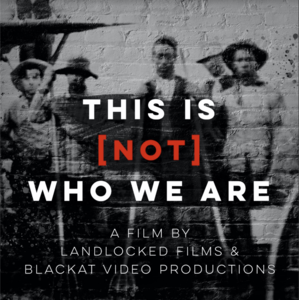GSL hosts film screening about the recent lived experiences of Black residents in Boulder


On Friday, June 16th, GSL hosted a showing of the film This Is [Not] Who We Are in the NIST auditorium on the DOC Boulder Labs campus. The film was produced by the Boulder-based Landlocked Films and Blackat Video Productions, and winner of numerous awards, including People's Choice Award at the 2022 Boulder International Film Festival, Best Feature Documentary at the 2022 Hamilton Black Film Festival, and Best Picture at the March 2022 Los Angeles Film Festival. The documentary weaves together the recent lived experiences of Black residents in Boulder with a historical overview of the challenges faced by Boulder's Black community, exposing issues faced by cities across the country that struggle to reconcile their inclusive ideals with the reality of their communities and encouraging a dialogue on those struggles.
After the in-person screening, two of the film’s subjects, Zayd Atkinson and Pedro Silva, conducted a Q&A session with the audience. Atkinson’s targeting by Boulder police while picking up trash outside his college dorm, recorded by onlookers and police body cameras, was featured in the documentary; Silva was a pastor for a church in downtown Boulder at the time of the film, and both have continued as activists and organizers since filming took place. Their discussion, driven by audience questions, covered topics including how Boulder and their lives had changed in the few years since the documentary was filmed, the prospects of Boulder’s Police Oversight Panel, raising children to accept and respect diversity, talking to prospective hires about what to expect in Boulder, unintentionally alienating members of marginalized groups through performative friendliness and more.
The following Friday, a discussion session was held online for GSL team members who couldn’t attend the in-person screening but had seen the film either broadcast on PBS or streaming through the PBS website. That conversation ranged over subjects such as parts of the film viewers found especially surprising or affecting, including the bullying of children and the dismantling of Boulder’s historic Black communities; microaggressions; bystander intervention; effective allyship; community organizing, including the local chapter of Showing Up for Racial Justice, or SURJ; the effect of Boulder’s housing and building restrictions on historically underserved groups; reading recommendations and a possible book club; the label “racist” and its distinctness from unconscious bias; and more.
Between the in-person and online sessions, approximately 100 colleagues have watched the film and participated in GSL-organized discussions.
